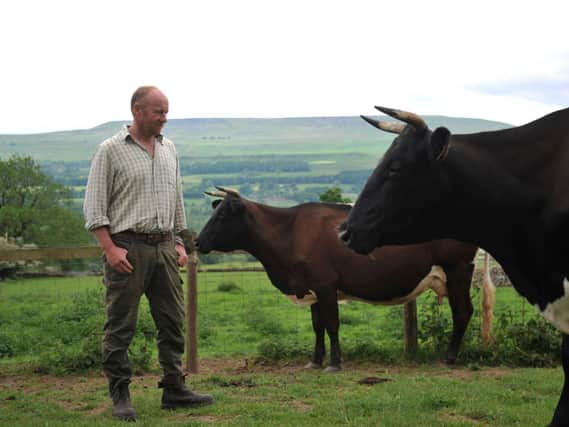Hope for one of our rarest native cattle as a new herd is founded in North Yorkshire


Stuart Raw, who farms in Wensleydale is building a new herd of Gloucester cattle, a breed which earlier this year was placed on priority ‘red’ list for cattle by the Rare Breed Survival Trust (RBST).
Working in partnership with Ripon-based company Farmison & Co, Mr Raw stepped in to buy the cattle after hearing they
were due to be sold at an auction mart.
Advertisement
Hide AdAdvertisement
Hide Ad“We saw the opportunity to help save a rare breed and jumped at the chance,” Mr Raw said.
The seven cows, some of which are in calf, along with eight calves are now out grazing on the Wensleydale farm and Mr Raw said there are plans to buy a bull and build up the herd.
“Being docile and pleasant creatures, the cattle are a joy to have in this landscape and we look forward to working with the Gloucester Cattle Society to establish the herd and support the wider breed.”
John Pallagi, co-founder and CEO of Farmison & Co which specialises in meat from heritage breeds, said: “It would have been sad if these extremely rare Gloucesters had ended up going to slaughter.
Advertisement
Hide AdAdvertisement
Hide Ad“They have a special place in the history of this country and now we can play our part in
building up their numbers, so they have a role in its future too.”
The Gloucester is an ancient breed of cattle which dates back to the 13th century.
As well as their beef, they were highly valued for their milk which was used to make single and double Gloucester cheeses.
Advertisement
Hide AdAdvertisement
Hide AdThey were also the breed used by Sir Edward Jenner in his pioneering smallpox vaccine work in the 18th century.
But changing farming practices over the past century saw the breed decline so drastically in 1972 there was just one herd left. Since then rare breed enthusiasts have helped numbers recover but between 2006 and 2020 herd numbers have dropped by half.
Liz Coates, secretary, Gloucester Cattle Society, said the breed, like other native breeds can provide the key to future sustainability.
“Gloucesters are not only a valuable part of this country’s history – having survived and adapted for at least 700 years – they are one of numerous native breeds that hold the key to sustainable, low input meat and milk production for the future.”
Advertisement
Hide AdAdvertisement
Hide AdShe added that the Society is “committed” to ensuring the breed’s future by educating farmers and the public on the benefits of keeping Gloucesters and eating their produce.
As well as the Gloucesters, Mr Raw is also the custodian of a fledgling herd of White Park cattle, bought through an innovative ‘finance scheme’ with Farmison & Co.
The ancient breed once associated with the Druids and Celts is listed as ‘At Risk’ on the RBST Watchlist.
Under the scheme, which was piloted with a Dexter herd through the same partnership, Mr Raw will pay for the upkeep of the livestock over the next 18 months, managing the herd, breeding and its expansion.
Advertisement
Hide AdAdvertisement
Hide AdThe aim of the collaboration is to spread the financial cost for the farmer with a guaranteed outlet for the end product through Farmison.
"Together we can help save breeds that might otherwise disappear from our countryside,” said Mr Pallagi